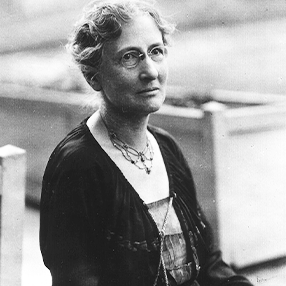The Giant Cactus of Arizona
The cactus in the desert stands
Like time’s inviolate sentinel,
Watching the sun-washed waste of sands
Lest they their ancient secrets tell.
And the lost lore of mournful lands
It knows alone and guards too well.
Wiser than Sphynx or pyramid,
It points a stark hand at the sky,
And all the stars alight or hid
It counts as they go rolling by;
And mysteries the gods forbid
Darken its heavy memory.
I asked how old the world was—yea,
And why yon ruddy mountain grew
Out of hell’s fire. By night nor day
It answered not, though all it knew,
But lifted, as it stopped my way,
Its wrinkled fingers toward the blue
Inscrutable and stern and still
It waits the everlasting doom.
Races and years may do their will—
Lo, it will rise above their tomb,
Till the drugged earth has drunk her fill
Of light, and falls asleep in gloom.
This poem is in the public domain. Published in Poem-a-Day on March 23, 2024, by the Academy of American Poets.
“The Giant Cactus of Arizona” appears in Harriet Monroe’s third poetry collection You and I (The Macmillan Company, 1914). In “Harriet Monroe’s Pioneer Modernism: Nature, National Identity, and Poetry, A Magazine of Verse” (Legacy, Vol. 21, No. 1, 2004), professor of English Dr. Robin G. Schulze observes, “Monroe’s notions of modernist verse were rooted in her imaginative confrontation with the American land. Arizona saved Monroe’s life. Her contact with the vast spaces of the American West also saved her career. […] By the time Monroe started her periodical, the spiritual and aesthetic ‘use’ that she imagined for nature was already in danger of seeming culturally retrograde. To argue that nature served as an artistic resource, as a renewer of the soul and the imagination, was still to argue for the land in feminized aesthetic terms that Monroe’s culture found increasingly suspect. Indeed, a decade and a half after her first trip to the Grand Canyon, Monroe’s strategy for keeping artistic faith with American nature contributed to many younger modernists’ view that she was an irrational sentimentalist. In May 1914, Monroe wrote to [Ezra] Pound rejecting a number of his poems that she deemed ‘hardly up to your usual form.’ Sending back ‘The Temperaments,’ ‘Emma,’ ‘Phyllidula,’ ‘The Father,’ and ‘Lesbia Ilia,’ she took the opportunity to diagnose the cause of Pound’s poetic slump: ‘Oh little indoor England and its tiresome little adulteries! For the love of heaven,’ she begged him mockingly, ‘get outdoors!’”

